#K.M. Weiland
Text
K.M. Weiland:
Johne Cook and I met on an online writing forum over 15 years ago, and he remains one of my favorite people to have entered my life in this journey. I have long admired his pragmatism, his insight, and his general cool in the face of the Internet’s insanity. To this day, I will often ask myself, “What would Johne do here?”
He has always been open about his experience as a writer with ADHD—both the challenges and his solutions for overcoming them. Today, I’m excited to have the opportunity to let him share his experience, tips, and resources with you. Enjoy this treasure trove of insight!
Discovery
I wish I knew then what I know now.
For my first 45 years, I thought I was broken: I was a daydreamer, I couldn’t focus on things everyone else thought were important, I fidgeted when I should have been focusing, and I focused intently on the wrong things when people wanted my attention elsewhere.
[...]
20 notes
·
View notes
Text
I have a suggestion…regarding Character Arcs.
A friend of mine, who also happens to be a writer, gave me a book called CREATING CHARACTER ARCS, The Masterful Author’s Guide to Uniting Story Structure, Plot, and Character Development, by K.M. Weiland, PenForASword Publishing, 2016. (Thank you Tina Oppici). Tina has been suggesting I read it for over two years. She finally handed me a copy and I’m glad she did.
I suggest you read it, too.…

View On WordPress
2 notes
·
View notes
Text
How Perfect Does Your Story’s Structural Timing Have to Be? – by K.M. Weiland
on Helping Writers become Authors:
Structural timing is one of most prominent features of story structure. This positioning of a story’s important turning points is one of the keys for creating a story that feels right to audiences. As often as not, when something seems off about a story, the problem can be narrowed down to wonky structural timing. This makes structural timing one of the most…
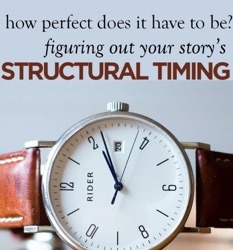
View On WordPress
#authors support#help#helpful#information#Informative#K.M. Weiland#re-blog#supportive#writer&039;s support#writing
0 notes
Text
I actually had to sleep on it to figure out why Eclipse Lake bothers me so much. Basically it stems from how we were robbed of an emotional confrontation between Luz and Hunter:
Hunter and Amity's fight has no emotional weight to it, since Hunter is Luz's personal antagonist. Their character arcs run parallel to each other as they're both going through a deconstruction of The Chosen One archetype. Like it or not Luz is the most important character for his positive change arc. She spearheads it in Hunting Palismen and is the catalyst for his darkest moment in Hollow Mind. So it makes more sense for Luz to be at this pivotal moment in his arc than Amity.
It's also important to note that in EL he is choosing Philip over Luz. He wants Philip to see he is still "useful" more than he wants Luz to be able to return home. This choice contrasts with the choice he made in Hunting Palismen where he chose Luz over Philip. His "uncle" needs the palismen for his condition, but he lets Luz take them back to the school. Hunter knows Philip is merciless but is willing to risk harsh punishment to preserve his bond with Luz.
However, in EL It's a different story because he doesn't have the leeway for failure. Another thing that we need to keep in mind is that he doesn't have to be at Eclipse Lake. Philip told him to stay in the castle and sent Kikimora to get the Titan Blood in his stead. Hunter disobeyed him and needlessly created a self-imposed ultimatum because of his flawed mindset... Do you see where I'm trying to go with this?
A fight between Luz and Hunter would have been the perfect moment to plant a seed of redemption for Hunter. One where he realizes that he didn't need to take away Luz's chance at returning home and tries to make it up to her.
Now I know some people would say: "The reason why Luz isn't there is because she would have destroyed the key instead of simply breaking the glass encasing the blood."
Yes, Luz has shown that she is willing to destroy her chances of going home just so Philip can't return to the human realm. But she was only able to destroy the door because Philip had no idea she'd go that far. Taking away another chance from Philip isn't something she'd be able to do as easily a second time. Hunter definitely knows about the door incident, since he is Philips personal guard and the one who helped him rebuild the door. And it's implied with his conversation with Amity that he has access to personal information. He's also had chances to observe Luz on a one one one basis.
The point is is that he would know what Luz is like through personal experience AND information gathered by other sources. He's not going to let her completely destroy that key. He would have to be completely braindead to let that happen.
TLDR: It would have ended the same way regardless if Luz was there or not. Also, Luz not being there undercuts the emotional impact of that fight, because at it's core it's about Hunter choosing Philip over Luz.
#i wish this was more seamless and elegant but I honestly don't want to spend a day on this. I want to work on drawing.#and I dont know how to condense the entirety of Creating Character Arcs: The masterful authors guide to uniting story structure. plot.#and character development by K.M. Weiland into every not-so-positive post i have about this show#by the way i recommend that book to anyone who wants to get better at storytelling#it's a really good blueprint#writing analysis
12 notes
·
View notes
Note
Would you point me in the direction of a list of books on the craft of writing? Thank you!
Writing Craft Book Recommendations
-- Word Painting: A Guide to Writing More Descriptively by Rebecca McClanahan
-- Reading Like a Writer by Francine Prose
-- Bird by Bird by Anne Lamott
-- Save the Cat! Writes a Novel by Jessica Brody
-- Steering the Craft by Ursula K. Le Guin
-- The Anatomy of Story by John Truby
-- The Kick-Ass Writer by Chuck Wendig
-- Wonderbook by Jeff Vandermeer
-- Story Genius by Lisa Cron
-- The Magic Words by Cheryl B. Klein
-- Story Engineering by Larry Brooks
-- Structuring Your Novel by K.M. Weiland
-- Outlining Your Novel by K.M. Weiland
-- Poetry Pauses by Brett Vogelsinger
Keep an eye on the comments and reblogs for others' suggestions!
•••••••••••••••••••••••••••••••••
I’ve been writing seriously for over 30 years and love to share what I’ve learned. Have a writing question? My inbox is always open!
LEARN MORE about WQA
SEE MY ask policies
VISIT MY Master List of Top Posts
COFFEE & FEEDBACK COMMISSIONS ko-fi.com/wqa
323 notes
·
View notes
Text

I'm reading Creating Character Arcs by K.M Weiland and looking at the definition of a character's needs and wants. My brain rot sees Sydney as a literal need for Carmy and decided to do a spin on the definitions along with describing Carmy's fallen arc.
The Definitions of want + need
Want (the lie): this is what the character thinks will bring them fulfillment and what will cure him. This character's desire (often external) can come from a limited perspective. This want is also influenced by the character's backstory where something happened in order for the character to believe in the limited perspective.
The need (the truth): The antidote to the lie, the most important thing in the character's life. If he misses out on the truth, he will never grow. this is what brings the character to wholeness. It heals wounds and, ultimately, can fulfill the true longings of the character's desires. If the character faces the truth, it will positively affect them, or he can ignore it, the wound worsens, and he can regress into a negative character arc.
Keep in mind that the needs and wants can be multiple things in the story, syd may be one of the truths carmy must accept, but he also has to accept the ultimate truth to really move forward.
Want

Carmy wants amusement and enjoyment throughout the second season to fix his negative feelings about cooking and opening The Bear. When Carmy decides to help Claire in 2x03 Sundae, he embraces the lie as he spends more time with her to bring him joy outside work.
As Carmy pursues his wants, he ignores the very needs that will heal his wounds.
Need

..Sydney is the need- what Carmy must address in order to become a happier, healthier version of himself. Sydney's own needs- Carmy's focus, is the key to Carmy's fulfillment.
Carmy needs to remember to call the fridge guy even when Sydney reminds him, skips the food tour, and avoids Sydney during the menu planning process.

Throughout the story, Carmy is presented with several opportunities to address his needs. His final chance to move forward and embrace the truth comes when Sydney calls out Claire's table. However, when Carmy decides to choose his wants over his needs, he experiences a fallen character arc and reaches a dark moment where he realizes he's stuck in his own path and calls out for Sydney, the very thing he always needed but missed. Carmy is then forced to confront his self-sabotage and embrace the consequences of his actions, wondering if he has lost the truth indefinitely.
When Sydney is not present, Carmy clings to a lie and resists new needs. The Dark Moments and Fallen Arc reveal the truth.
The Fallen Arc
CHARACTER BELIEVES LIE > CLINGS TO LIE > REJECTS NEW TRUTH > BELIEVES STRONGER/WORSE LIE
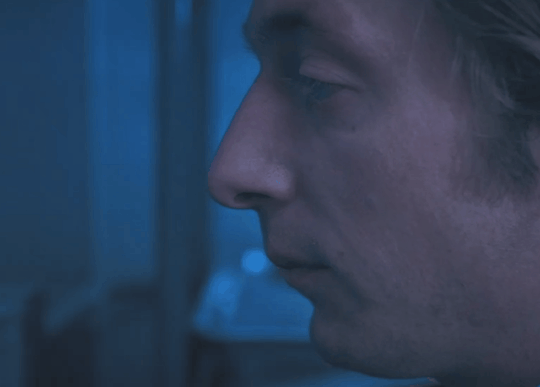
The hard truth at the end of season 2 is that Carmy was his worst enemy. The other lies he accepted at the end of this season was that he failed his team. He's good at what he does when he isolates.
Accepting these lies leaves Carmy through further depths as he cuts himself off from people closest to him.
I'm curious as to whether Carmy will isolate himself from Sydney now that he knows she's a need.
Ultimately, the show has many truths carmy needs to face, his mother, his mental health, Sydney, etc. and I'm excited to see the truth Carmy will have to address come season 3.
#sydcarmy#carmy x sydney#the bear fx#sydney adamu#carmen berzatto#the bear meta#i absolutely love discussing character arcs and story structure- please feel free to add on#thoughtful chsos posts
85 notes
·
View notes
Text
K.M. Weiland is one of my favorite authors on writing. She has an entire series and website devoted to "helping writers become authors."
#author advice#writing resources#writing#writers#writers on tumblr#writing community#writerscommunity#writer things#writerslife#novel writing#writing tips#writing tools#how to write#writing help#writing advice
114 notes
·
View notes
Text
Kyo, Momiji, and the beach trip that changed everything (part 4 of 5)

So, the beach arc is one of the best parts of the beautiful story that is Fruits Basket. Functionally, it's the midpoint, occurring from chapters 54-65 (out of 136) of the manga, and episodes 31-35 (out of 63) of the anime.
What is the midpoint in story structure? From author K.M. Weiland's site Helping Writers Become Authors:
As the centerpiece of the story, the Midpoint in many ways encapsulates the entire point of the story. Plot, character arc, and theme all coincide here (more obviously even than usual) to provide the protagonist with at least the opportunity to see the world in a different and potentially more functional way than previously. Depending on what the character realizes and accepts at the Midpoint, he should be able to use this new knowledge to move onward more effectively toward the plot goal.
In the article I linked above, Weiland talks about the two halves of the story's midpoint: first is the plot revelation, where something key about the external plot is revealed to the protagonist; and second is the moment of truth, where the protagonist uses that new information to change their perspective on the story.
For Tohru, the main protagonist, the plot revelation is when Akito reveals that the cursed Sohmas will all return to her and Kyo will be confined after graduation. The moment of truth is when she decides she wants to break the curse.
For Yuki, second protagonist, the plot revelation is that Tohru was the little girl he saved all those years ago, and the moment of truth is that it's time for him to "open the lid" and accept his feelings for what they are.
Even Hiro experiences his own midpoint shift. His plot revelation is that Tohru, like him, has her own feelings hidden deep in her heart, and that she covers up her pain with a smile. His moment of truth is that he wants to stop taking out his frustration on Tohru.
So, let's look at the beach arc as it pertains to Momiji and Kyo and their character arcs.

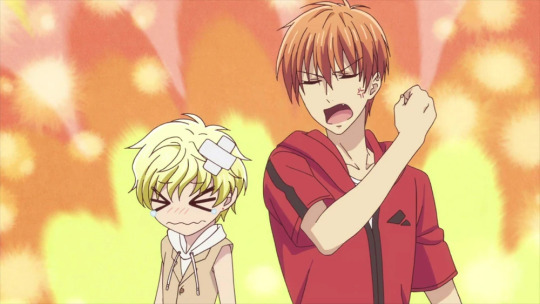
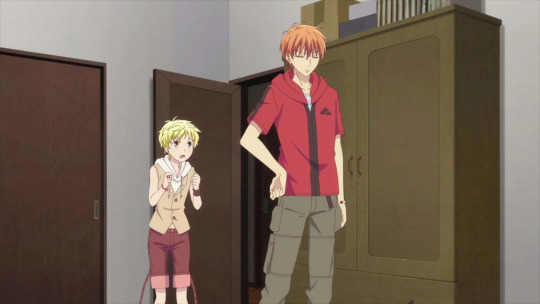
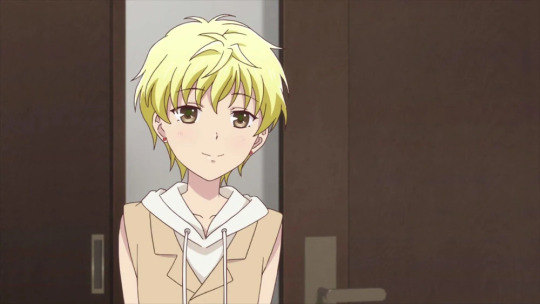

First, we have this cute little moment where Momiji comes to let Kyo know about the trip.
Momiji: Kyo! Hey, Kyo. You sick?
Kyo: I'm tired. I don't have the energy to talk to you. Get out.
Momiji: Got it. *inhales* We're going to the vacation house tomorrow, so get packed!
Kyo: (angrily) You don't get it! (calmly) Wait, tomorrow? To the vacation house?
Momiji: Yep!
Kyo: Don't 'Yep' me!
Momiji: Wah! Kyo hit me! But you'll come, right? You won't say no, right? Right?
Kyo: Stop bugging me.
Momiji: Tohru will be sad if you don't come. We'll play together! We'll swim together!
Kyo: I said to stop bugging me! I never said I wouldn't go. Sheesh. I'm so tired.
Momiji: You've gotten nicer.
Kyo: Huh?
Momiji: Nothing! Oh yeah, I'm gonna catch stag beetles! And Hercules beetles!
Kyo: You're being serious?
I love that Momiji is consistently the one to invite Kyo to do things. While Yuki is helping Tohru finish her homework, Momiji tells Kyo about the trip in the most obnoxious way possible. Kyo gets annoyed, naturally, and gives Momiji a bonk on the head. Momiji pretends to cry (as usual), but then asks Kyo if he'll come.
Momiji seems genuinely worried that Kyo won't come, and goes right for Kyo's weak spot to manipulate him, saying, "Tohru will be sad if you don't come."
I also love the soft look on Momiji's face when he says to Kyo, "You've gotten nicer." Cuuuuuute.
After they arrive, there are a few cute moments in the first day or so at the beach. When Momiji points out Tohru's swimming and Kyo goes to rescue her (because he knows she's holding her breath), he asks Momiji to teach her how to breathe while swimming. Here, Kyo demonstrates a great deal of trust in Momiji. Tohru's safety is the most important thing to him, and he's trusting Momiji to look out for her safety, too.
I also love Momiji's comment when Yuki baits Kyo into staying in the water to race. "They should just swim like normal people. How childish." Yeah, okay Momiji.
Later (and this may be a change for the anime, as I couldn't find it in the manga), when they're all looking at the beetles, Momiji says Kyo is the person who taught him the sugar water trick.
But soon, Akito arrives, and everything changes.

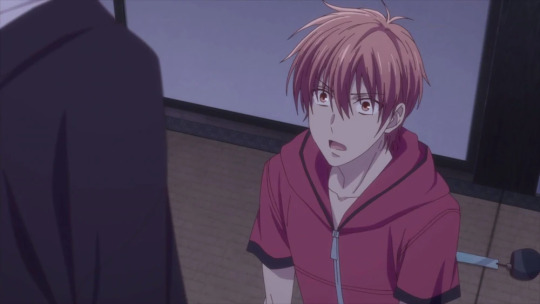
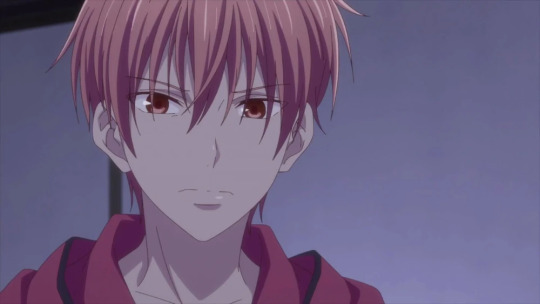
This is a great scene for understanding how Akito operates as an abuser, but to keep the focus on Kyo, it's when Akito brings up Tohru that Kyo's entire demeanor changes. He'd been crying, begging Akito to stop, at his lowest point both literally and figuratively, when Akito shifts the conversation from Kyo's mother (and, in his mind, Kyoko) to Tohru, and her reaction to his True Form.
He immediately shifts from self-pity to fear and then anger, yelling back at Akito, defending Tohru from Akito's accusations, even when Akito is yelling at him to shut up. Suddenly, he falls quiet, and we hear his internal monologue:
She knew that if she let go of my hand, I would never return. That I might never return to anybody. She didn't take up all my pain. She didn't fill in all the brokenness. But those... those weren't important. The most important thing was that she stayed with me. Finding joy in the smallest things, being happy and smiling so cheerfully... Why? She should think of herself more. Why? Doesn't she think she's getting the short end of the stick? She thinks that she's stupid, or that there's nothing good about her.
And then we see Momiji and hear his voice.

It's a waste of time to think about loss or life getting harder. The traveler never thought about that stuff. Even if other people think that makes her an idiot, I just don't. That's all. Yuki, Kyo, What about you? What do you think when you close your eyes?
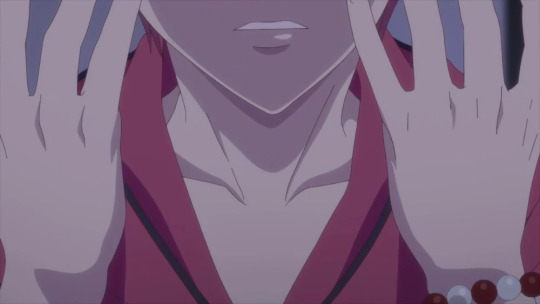
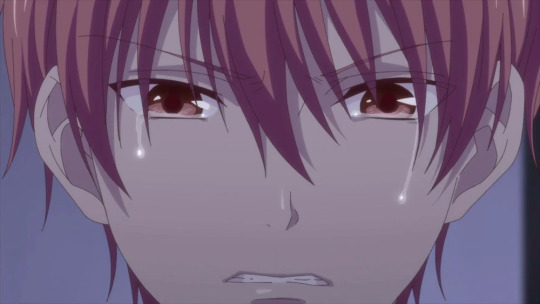
We then see Kyo with his hands over his eyes, interspersed with images of Tohru and the sound of her saying his name, as he lowers his hands and looks directly at the camera, articulating exactly how he feels about Tohru.
I love you. I love you so much. Just as you are.
It's a great callback to The Foolish Traveler, and the way Momiji closed his eyes when he was reflecting on how he interpreted the story, opening them when he realized he saw it differently than his classmates.
The sequence where Kyo finally realizes his feelings for Tohru is beautiful, possibly one of the best-done sequences in the anime. It's painful and moving and both Yuma Uchida and Jerry Jewell deliver gorgeous performances as Kyo. This is Kyo's plot revelation.
But most importantly (for the purposes of this series of posts, at least), it's Momiji whose voice Kyo hears at this crucial moment. It's Momiji whose words lead Kyo to realize he's in love with Tohru.
There's a lot that happens between Kyo's revelation that he loves Tohru and when he finds her on the beach that evening, but it's less important to the relationship between Kyo and Momiji, so I won't include it in this post.
What is important, though, is Kyo's moment of truth. The thing he decides is to spend as much time with Tohru as possible while he's still free.
I love you. I don't want to take anything else from you. I don't want to trample you ever again. At some point, I hoped we could always be together somewhere far off, but I won't hope that anymore. I won't hope that I could make you my own anymore. I won't hope that, so please, at least... at least be by my side for the time I have left.
I want to be with you. Until we're separated far apart.. until the last moment.
I wonder who put that idea in his head?
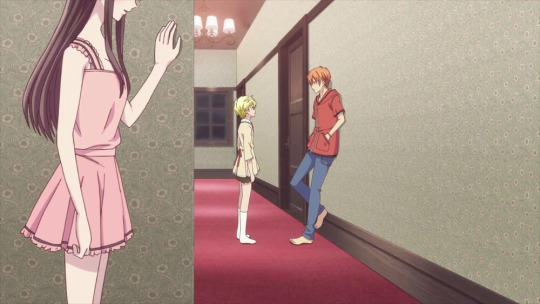
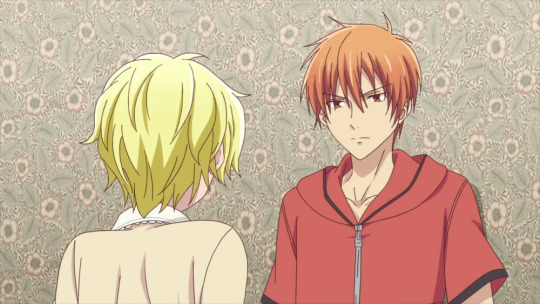
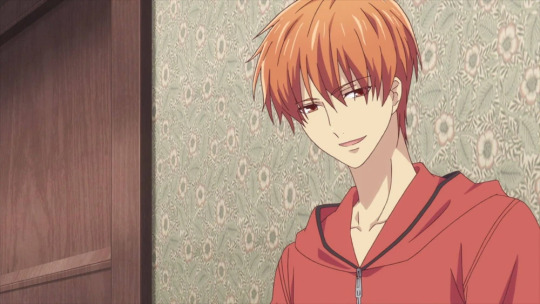
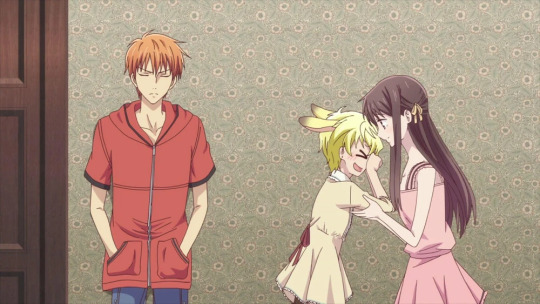
In the next episode, we get this conversation between Kyo and Momiji.
Momiji: Kyo, Akito didn't call you in tomorrow, right?
Kyo: Nope.
Momiji: Really? If I thought, 'Good for you,' would you get mad?
Kyo: I wondered why you all abandoned Tohru as you were told like good little kids. But I see. If you prioritized Tohru over Akito, Akito would get mad, huh? That would just make Tohru look bad. You guys, including Yuki, were protecting Tohru from Akito, huh?
Momiji: You make it sound like we were doing such a good thing. But that's not it. We've- I've been doing it all wrong. I'm selfish for wanting to make memories with Tohru, despite everything. I'm selfish for loving Tohru so much.
Kyo: I'm selfish, too.
Momiji: Hmm?
Kyo: Never mind. Anyway, weren't you going on about watching something on TV earlier?
Tohru: Momiji-kun! Kyo-kun!
Momiji: I was so scared! Kyo was trying to mug me!
Tohru: What?
Kyo: Seriously, you think I'm some delinquent?!
They both display a vulnerability and honesty here that they've really only shown before to Tohru. Kyo's reflecting on his anger at Yuki, and Momiji's being much more straightforward than he usually is, stating his realizations as they're coming to him, rather than using them to manipulate. I also love the detail of Momiji correcting from "We've" to "I've." It really shows the change in his maturity that occurred during this arc.
I see this as Momiji's plot revelation, that fun isn't the most important thing when you love someone.
This is also the first time Kyo verbalizes his feelings for Tohru out loud, if obliquely. When he smiles to himself and says, "I'm selfish, too," he's referencing what Momiji just said, that he's selfish for loving Tohru so much. It's notable that the first time he does this is in front of Momiji, even if he doesn't repeat it when it's clear Momiji didn't hear what he said.
I think, from this point on, Momiji and Kyo are trusted confidants for each other. This will come up more in part 5, but I really just love the way their relationship matures here.
And then, Akito returns.
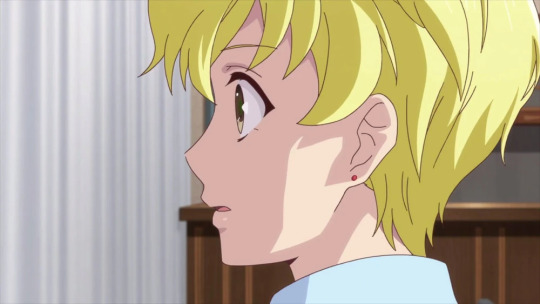
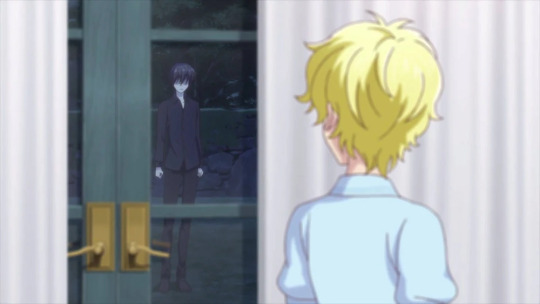

This is one of the most harrowing sequences in the anime. We know Akito's already in a bad mood, we know she blames Tohru for taking away her Zodiac, and we've seen exactly how she abuses those she serves as god.
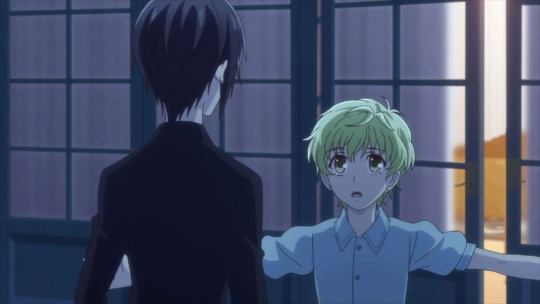
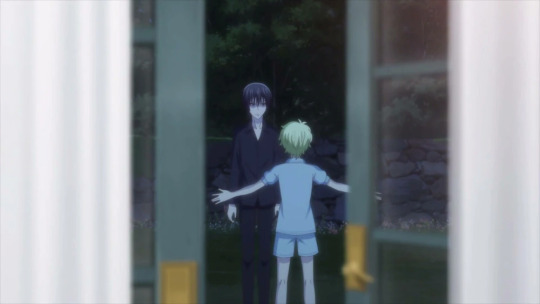
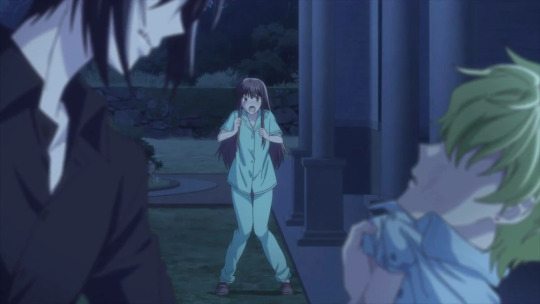
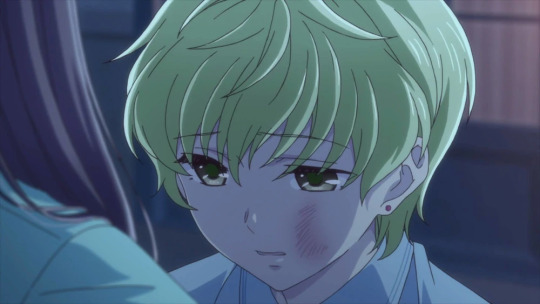
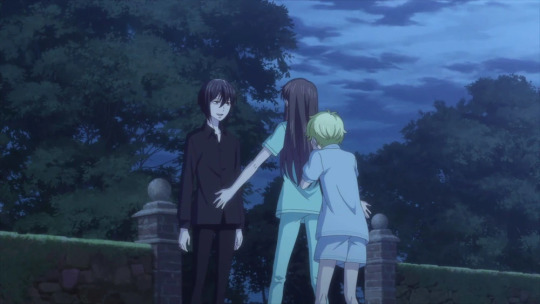

Momiji: Akito. What are you doing here so late?
Akito: I came to see Honda Tohru-san. I have to return home suddenly, you see. But I haven't seen Honda Tohru-san yet.
Momiji: Right now? But Tohru's most likely sleeping.
Akito: Wake her.
Momiji: No. Akito, you're mad right now, right? You'll take out your anger on her, huh? Akito, what's wrong? Why are you so mad? Did something happen?
Akito: Something happen? What? Why do you need to know? You want to get to know me? To understand me? Why?
[Akito punches Momiji]
Akito: You make me sick! Understand? Understand me? You just want to belittle me! You just want to define me by your twisted logic, to paint me as a villain!
Tohru: Stop, please!
Momiji: T-
Tohru: Sto- stop, please!
Akito: Stop? You're giving me an order. Terrible. Terrible. You're not a very nice person.
Momiji: Akito!
Akito: But Tohru. Honda Tohru, I was kind enough to come see you. I don't care how disrespectful you are to me. There's... there's something I came to tell you. Don't be so full of it, scum. You might think you saved Yuki and Kyo. Better take that arrogance down a notch right now. Let me tell you something. I'll tell you. Kyo, you see, after high school, will be confined. Just like the previous cat, confined for life.
It's here that we see Momiji is no longer there. In the manga, we see Momiji run away. Akito and Tohru's conflict continues, but I want to focus on Momiji's actions here.
When he understands the situation, he starts gently, reasoning that Tohru is probably sleeping. When that doesn't work, he moves to defy his god in order to protect her.
When Tohru shows up and puts herself between Momiji and Akito, Momiji is clearly upset. He'd only wanted to keep her from getting hurt, and now she's trying to protect him. He feels like he's failed, but the danger is still happening. When Akito takes Tohru by the head and starts telling her about Kyo's impending confinement, he runs for help.
Momiji likely blames himself for Tohru getting hurt. It was his idea to go to the beach house, and he angered Akito before Tohru arrived. His moment of truth is that he needs to focus on protecting Tohru and consider her safety in the future.
I wonder where he got that idea.
It's worth noting that this scene happens the same night as his hallway conversation with Kyo. While Kyo was beginning to understand that fighting isn't the only way to protect someone, and that sometimes you need to keep your head down and play the role in which you've been cast in order to protect someone, Momiji was learning the opposite lesson, that sometimes, you need to acknowledge the hard truths about a situation, that fun and pleasure don't erase pain, and that some things are worth fighting for.

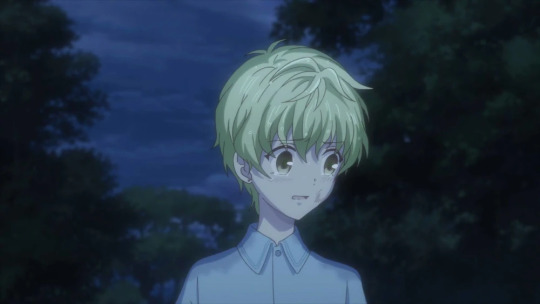
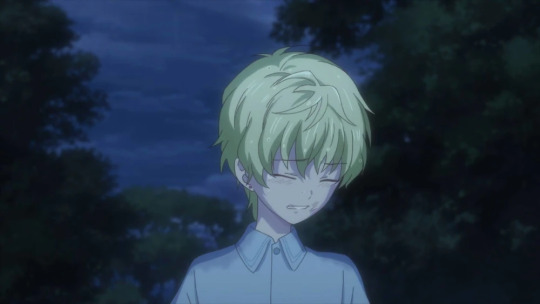
Akito and Tohru's conflict ends when Kureno arrives and takes Akito back to the estate. Next, Shigure and Hatori arrive, and when Tohru asks why they're there, Shigure reveals where Momiji ran off to.
Shigure: Momicchi ran to me in terror. I didn't know what was wrong.
Tohru: Is Momiji-kun hurt!? Where's Momiji-kun!?
Hatori: Don't worry. He's right there.
Tohru: Momiji-kun! Momiji-kun, are you all right?
Momiji tries to smile, but he can't, and he breaks down instead.
We've seen Momiji fake cry dozens of times before now. We've seen real tears from him only twice: once when he told Tohru about his mother (and even then, it was only after he transformed that he let himself cry), and once on Kisa's behalf, when he was telling the others about her bullying, and that he imagined how he'd feel if people laughed every time he spoke.
But this is the first time we've seen him break down.
Again, Momiji is blaming himself for what happened. He sees the mark on Tohru's face, and he knows she got hurt even worse after he left. He's upset that she ended up protecting him instead. He believes he's failed in every way. It's a feeling Kyo's incredibly familiar with.
But even though Momiji thinks he's responsible for Tohru getting hurt, everyone acknowledges he did something very difficult and brave.
Shigure: Well, Momicchi really hung in there. Compared to him, look at the other young folk.
Hatori: Compared to him, look at us... right?
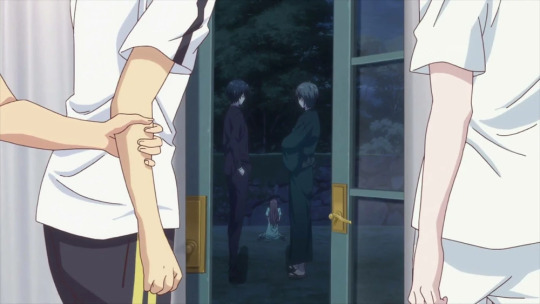
It's then revealed that Yuki, Kyo, and Haru were watching from just inside, and Haru was physically holding Kyo back from intervening.
Haru: See, Akito left. I told you Momiji would get the older ones.
Kyo: I'm so pathetic I could puke.
Kyo is ashamed that he didn't act, even though he knows it wouldn't have helped, and might have gotten Tohru hurt worse.
Momiji and Kyo both feel responsible, but by thinking themselves responsible, they belie the fact that they don't hold the other person responsible. Kyo sees that Momiji actually did something, that he stood up to Akito, while he stood back and let Tohru get hurt. Momiji isn't upset that no one else stood up to Akito beside him. He's not even sure that was the right thing to have done.
But they're both wrong, of course. The only person who's actually responsible for Tohru getting hurt is Akito.

Thankfully, the arc ends with a nice moment of everyone enjoying fireworks together. They've all changed, but some things will always be the same.
Momiji: Let's do some sparklers together!
Tohru: Okay!
Momiji: Kyo! Come do them with us, Kyo!
Kyo: So annoying. Just do them without me!
Yuki then baits Kyo into joining them, and the four sit together and do fireworks.
Even after everything that's happened, Momiji's still the one who invites Kyo to join in the fun.
Momiji and Kyo: Part 1 | Part 2 | Part 3 | Part 5
#fruits basket#furuba#fruba#kyo sohma#yuki sohma#tohru honda#hiro sohma#momiji sohma#shigure sohma#hatori sohma#sad seahorse daddy hatori sohma#hatsuharu sohma#beach arc#analysis#character analysis#fruba analysis#furuba analysis#fruits basket analysis#midpoint#story structure#rich characterization#character development#character traits#romance#kyo and momiji are basically brothers!#momiji's rabbit ears#bunnyboy momiji#kyoru#kyo x tohru#by cinderella-ish
14 notes
·
View notes
Text
Tag Game: Tag nine (or more) people you’d like to get to know better.
Tagged By: @rainsofcamelot (thank you!)
Last Song: Hang ‘Em High by My Chemical Romance
Currently Watching: perpetually re-watching The Gilded Age, re-watching Downton Abbey, gonna start Sucession, Hbomberguy’s video essays
Three Ships: (I’m gonna do five instead of three) Bertha x George (of course), Ned x Catelyn, Gerri x Roman, Rhaenys x Corlys, Hades x Persephone (specifically from Hadestown)
Favorite Color: Ultramarine
Currently Consuming: Fanfiction, Cheez-Its, and Reese’s cups
First Ship: Fran x Maxwell from The Nanny (I have since come to my senses and realized that C.C. x Niles is the superior ship)
Relationship Status: Single 😉
Last Movie: Mean Girls (2024)
Currently Working On: Slowly but steadily writing my aforementioned angsty Bertha x George fic (I’m sorry for the wait, it’s my first fic, I’m nervous as hell), reading A Rome of One’s Own by Emma Southon, An Oresteia (trans. by Anne Carson,) and Divine Might by Natalie Haynes, annotating/taking notes on Writing Your Story’s Theme by K.M. Weiland
Tagging: @msharmonycobel @blizzaurus @mar-nu-falmar @leia-stark @orsuliya @marvellouslymadmim @cj-the-human-disaster @celebratechibi @this-geek @regardstosoulandromance
9 notes
·
View notes
Note
Any advice on how to write enemies-to-lovers relationships? I have these two characters (one is a heroine/ protagonist and the other is an anti-villain/ antagonist) that I imagine to start off as enemies and slowly fall in love, but I am afraid that they’re incompatible/ the chemistry between them won’t work. And I don’t want their relationship to be forced.
I did a post here on writing conflict in a romantic relationship:
Much of what I say there applies to enemies to lovers and is a good way to start thinking about the characters you have.
If you know you are writing enemies to lovers from the start of your story, the way you set up and create the characters is typically different to when you just write characters who aren't intended to get along ever.
Background bits that are relevant when I talk novel advice
For background reading, generally, if writing a novel, I would recommend familiarising yourself with some common story structures such as The Three Act Structure, The Hero's Journey or Savannah Gilbo's romance-specific take on the Seven Point Story Structure.
Also, this thorough guide on character arcs by K.M Weiland.
I feel it's important to throw this in, because I'm ultimately doing a quick tumblr post, so my tips aren't going to do dig super deep. I'm just hoping to get you thinking about your characters/offer perspective and hopefully clarity.
Now onwards, to enemies and lovers...
I personally like to think of enemies-to-lovers romance characters (though, let's be real, also my protagonists and antagonist generally) as a set. They don't have to match, but they are designed to comment on each other - be that through reflecting the worst or best (in a happy romance, they reflect the best) of each other.
E.g. for me they are often narrative foils or mirror characters. This means that the characters contrast in a way that they highlight each other's qualities, be it how they are different (foil) or how they are the same (mirror).
A romance story in particular is often all about answering the question 'why are these two great for each other?' 'Why should they be together?' 'Why is it worth fighting for this love despite all the obstacles in the way?'
In an enemies to lover's story, one reason is often because they have a unique perspective/ability to challenge each other to reassess their own attitudes and stances (see where this is going back to foils and mirrors?) and thus further each other's character arc.
Foil route:
A simple version of this is, 'hero' character must learn to look out for themselves and not just other people, 'villain' character must learn to not just look out for themselves in order to be truly happy. Bam, collide, and somewhere in the middle of these two extremes you have an actual healthy approach to life, which they end up landing on through interacting and learning from each other. Thus, despite being fundamentally different, they both make each other better, happier people, and this is the basis of opposites attract. They complement each other flaws.
The mirror route:
The characters, despite having opposing goals, learn as they interact with each other that they actually have a lot in common, value similar things, and so a bond forms between them because of this as they realise that, oh no, they actually like each other. A lot. The internal conflict of the novel is reconciling their growing fondness for each other with their still separate goals.
This also means that, for me personally at least, the two sides of your enemies/lovers romance need to be somewhat balanced. I.e. your antagonist cannot be unredeemable monster with no valid points to make, and nothing for your protagonist to reasonably attracted to in them. Similarly, your protagonist cannot be always right, completely wholesome or perfect or...what do they have to learn from the antagonist? What do they have in common?
Obviously, add attraction on top of this + specific reasons to be attracted to each other that fit your characters. Like, as many reasons as you can give why yess, these two, the better.
I don't know your characters, so I cannot tell you if they are incompatible or not. So take-away question, do your characters have the potential to support each other and make each other better? If not, then you may have great tension as a protagonist/antagonist dynamic and they may have sizzling antagonistic chemistry, but that does not necessarily mean they should be in a romance together.
174 notes
·
View notes
Note
How do you make a good character / three-dimensional character? I've been told before that my oc was "flat" and I fear that I'm not talented enough to change that. I don't know any good goals to give them.
Hey, it’s not about your skill as a writer. Making interesting and realistic characters is difficult and takes a lot of practice, so don’t be too hard on yourself.
It depends on the character, but I’ve found that there are several important questions you need to ask yourself and a couple questions you need to ask yourself.
What does your character want/pursue?
What does your character need? (This often directly contradicts the former)
What is stopping your character from achieving this?
What would happen if your character does not get what they need?
What would happen if your character got what they wanted?
What is your character think is their greatest fear?
What is their actual greatest fear? (Sometimes these differ)
What are your character’s hopes?
How do both of these affect the way your character behaves?
What would break your character?
What would cause your character to grow?
Those are just some basic ones to help out. The key for accurate writing is consistent characterization with attention paid to the way different factors would influence them.
If you’re able to check out or buy it, I’d recommend “Creating Character Arcs, The Masterful Author’s Guide to Uniting Story Structure, Plot, and Character Development” by K.M. Weiland. It goes into a lot more depth about it with examples that help illustrate the points, arcs, and characterization.
12 notes
·
View notes
Text
K.M. Weiland:
For many of us, writing is one of the most important things in our lives. And yet, it can be all too easy to let that “most important thing” end up at the bottom of our to-do list. If yet another day has passed in which you haven’t been able to write—or a day in which you did write but getting it done was a struggle—you’re not alone. Time management for writers is possibly one of the key skills of the lifestyle. This is true whether you write full-time or write around your full-time responsibilities.
40 notes
·
View notes
Note
If you're still doing this: top five podcasts OTHER that Presidential (I finished it two weeks ago 😁)
Unfortunately, I don't listen to many podcasts aside from Presidential (so thrilled you listened to it!), so I don't have too many options for this list.
Writing Excuses: Podcast about writing sci-fi and fantasy hosted by Brandon Sanderson, Howard Tayler, Dan Wells, and (eventually) Mary Robinette Kowal. I don't much like what the podcast has become with the new rotating roster of guest hosts, so I don't listen to it much anymore, but for a few years, I listened to this frequently and it taught me a lot about writing (my ideal era is roughly around Seasons 6-11). It's still the template for my ideal podcast format--several hosts, so you get multiple perspectives and voices, but with short episodes that stay on topic instead of turning into a drawn-out gabfest.
American History Tellers: An American history podcast that I found shortly after finishing Presidential. It tends to tell stories in 3-8 episode arcs about different eras of American history, with frequent interludes that provide cinematic retellings of historical moments, complete with sound effects. So far I've listened to an episode about Prohibition (which interviews the host of Presidential), the arc about Andrew Jackson, and an episode about Yosemite National Park, all of which I thought were excellent.
Story-a-Day Podcast: Another writing podcast, focused on short fiction in all genres. This one's more business-focused than I like, so I don't listen often, but every once in a while, I find an episode that provides insights that upend my ideas of writing.
K.M. Weiland's Writing Podcast: I do not get along with her hyper-structured story-writing method. But when I needed a break from Writing Excuses, I'd sometimes listen to an episode and find something worthwhile there.
Bible in a Year and Catechism in a Year: These are at the bottom of the list because I haven't actually listened to these yet, but they come highly recommended from family members who have listened to them, and the pieces I've heard sound excellent. Bible in a Year might be a bit of a harder sell for me, because Father Mike reads really fast, but the one episode of Catechism in a Year left me almost overwhelmed with excitement over how my readings about history and philosophy fit in with the Catholic ideas of how we're supposed to engage with public life.
#answered asks#podcasts#adventures in writing#writing excuses#catholic things#unfortunately i listen to mostly audiobooks these days so these are pretty much *all* of the podcasts i listen to#(aside from a few history ones i tried an episode of and forgot immediately)
7 notes
·
View notes
Note
Wait- I'm super intrigued by your bio. "Story theory." What is this referencing? Is there a particular story theory??
ahh, my bio!
"Main fandoms: GW2, Middle-Earth, and reality. Fiction enthusiast and student of story theory. What is reality but the story of the Creator, the Author, the Word - Jesus Christ?"
Needs some updating, clearly - I've moved GW2 activity to a sideblog and I need to add Miraculous Ladybug. But your question is abt story theory! Thanks for asking! Let's dive in!
By story theory I primarily mean 'what is the art of storytelling, and telling stories well.' I mean the big things such as the study of character arcs, narrative themes (a quite extensive field on its own), plot structure, symbolism, truths and lies, the role of backstory and character motivation, major, side and background characters, narratively condemning or exalting various traits, qualities, actions, etc. etc. as well as, perhaps, the more basic concepts such as show-dont-tell, scene-and-sequel, narrative foils, etc.
What story theory is NOT is things like grammar, how to use punctuation, paragraphs, or quote marks, formatting chapters, and the like.
As far as I know there is no 'one particular' story theory, although I suppose different people have different answers to some of the questions (such as how many acts are in one story or how many basic types of stories there are).
I have learned most of my story theory from K.M. Weiland's blog, Helping Writers Become Authors, as well as the book Techniques of the Selling Writer by Dwight V. Swain.
As a side note, I particularly love seeing how fiction mirrors reality and I do greatly believe we are all living stories, that the world has its story, that History is God's Story, and so on. That's what makes fiction compelling - because we've lived it or seen it lived. God is the author(ity) of the universe and I think that's beautiful.
And I love analyzing it lol.
I can answer more specific questions as well if you like! I llve this subject! Thanks for asking!
4 notes
·
View notes
Text
Honestly, If you want to understand any of my problems with this show I'd recommend reading: Creating Character Arcs: The Masterful Author's Guide to Uniting Story Structure, Plot, and Character Development (Helping Writers Become Authors Book 7) by K.M. Weiland
Her other books are also great as well.
#the more i think about it... it is actually a blessing they switched the endgame pairing#because i have no doubt they would have fucked up Luzs and Hunters relationship like they did with the other two pairings
16 notes
·
View notes
Note
Hi, I wanted to ask if you have any tips on how to put together a time schedule for writing a book. I tried to create one several times but always ended up with task paralysis since I didn't know what to do and how to time it. Do you have any advice? One of my goals is to at least write one book next year and without a schedule, I'm afraid I will lose sight of what I should do.
Schedule for Writing a Book
There's no universal timetable for writing a book. There are a million variables that play a role into how fast someone can write a book. Their personal writing speed, their level of experience, what they're writing and how long it will be, how much time they can put toward writing, and what they're aiming for (finished first draft, polished final draft, published book...) That said, there's really no way to come up with a timetable that will be reasonable for everyone.
Plot and structure are more important than a timetable. Even if there was a reasonable timetable for writing a book, that wouldn't really help you if you don't understand how stories work. If you were trying to build a house, I could say it will take a week to lay the foundation, and another month to frame the house and install the roof, and another month to install plumbing and electrical, and another month for insulation and drywall, but if you don't know how to do any of those things, that timetable doesn't help you. You need to learn how to actually lay a foundation, frame a house, install a roof, etc. if you want to actually build the house. Writing a novel is the same way. Before you can worry about a timetable, you have to learn how stories work.
Consider utilizing a book that will teach you plot and story structure while also helping you to plot out and structure your novel. There are all different ideas about how stories work and how to best plot and structure a novel, so there are a lot of really great books and workbooks out there that will help you do this. I'm a big fan of Save the Cat! Writes a Novel by Jessica Brody. Structuring Your Novel by K.M. Weiland is another good one, and it has an accompanying workbook. The Plot Whisperer by Martha Alderson is another one and it also has a workbook. You can also find printable novel planners on Etsy, often for less than 10 or 20 dollars.
If I had to give you a ballpark, totally arbitrary timetable, and assuming you have at least 3-5 hours a day to spend on writing, I would say you should probably plan to spend about a month plotting and planning, another month or two writing a zero draft or rough draft, another month or two reading through and revising that draft, another month or so with betas, another month or so revising, and another month or so editing and polishing. That gives you some wiggle room if you overshoot any of those estimates.
You can also "Weird Science" a timetable for yourself by taking a week or two to time yourself on various stages of story planning and writing. Start by finding a writing prompt that really inspires you. Then, time how long it takes (how many minutes spent) planning what you're going to write. Then, time how many minutes you spend actually writing. Finally, time how many minutes you spend editing and polishing. Now, math that out in conjunction with the length of your story. So, let's say you wrote a 5k word story and it took you 180 minutes to plot, 240 minutes to write, and 120 minutes to edit. So, for example, you plotted at 28 words per minute, so it would take you roughly 2500 minutes (41 hours) to plot a 70k word story. You wrote 21 words per minute, so it would take you roughly 3,333 minutes (56 hours) to write a 70k word story. And again, this is super rough, super ballpark but it can help give you a general idea of how long it might take you to actually do these things. But, again, it also depends a lot on what you're actually writing, what your level of experience is, etc.
My biggest tip for getting the work done is to use time blocking to help make sure you get the writing done. Essentially, each week you'll look at all your waking hours each day and block out the ones when you know you won't be able to write, such as the hours when you're at work or school. Then, schedule yourself for writing time in the available hours and make sure you stick to it. You may find yourself having to be really honest with yourself and do some serious prioritizing. For example, if you normally spend 2-3 hours a night playing video games, but you only have 3 hours of free time each night, you're not going to be able to spend 2-3 hours playing video games AND an hour or two writing.
Above all else, be gentle with yourself. Probably one of my biggest writing-related takeaways of 2023 was the brain science behind being overwhelmed by writing. So often, we put so much pressure on ourselves to meet goals, and get so frustrated with ourselves when we fail, that we end up making writing time something that fills us with anxiety. So our brains perceive that activity as a threat, which makes us want to avoid it. That said, make reasonable goals and set a reasonable timetable, but be very gentle with yourself if you struggle to stick to the timetable or meet your goals. Focus on the things you did accomplish, no matter how small and celebrate those accomplishments. Know that every little thing you do helps to move the needle forward a bit.
Happy writing and best wishes!
•••••••••••••••••••••••••••••••••
I’ve been writing seriously for over 30 years and love to share what I’ve learned. Have a writing question? My inbox is always open!
LEARN MORE about WQA
SEE MY ask policies
VISIT MY Master List of Top Posts
COFFEE & FEEDBACK COMMISSIONS ko-fi.com/wqa
123 notes
·
View notes